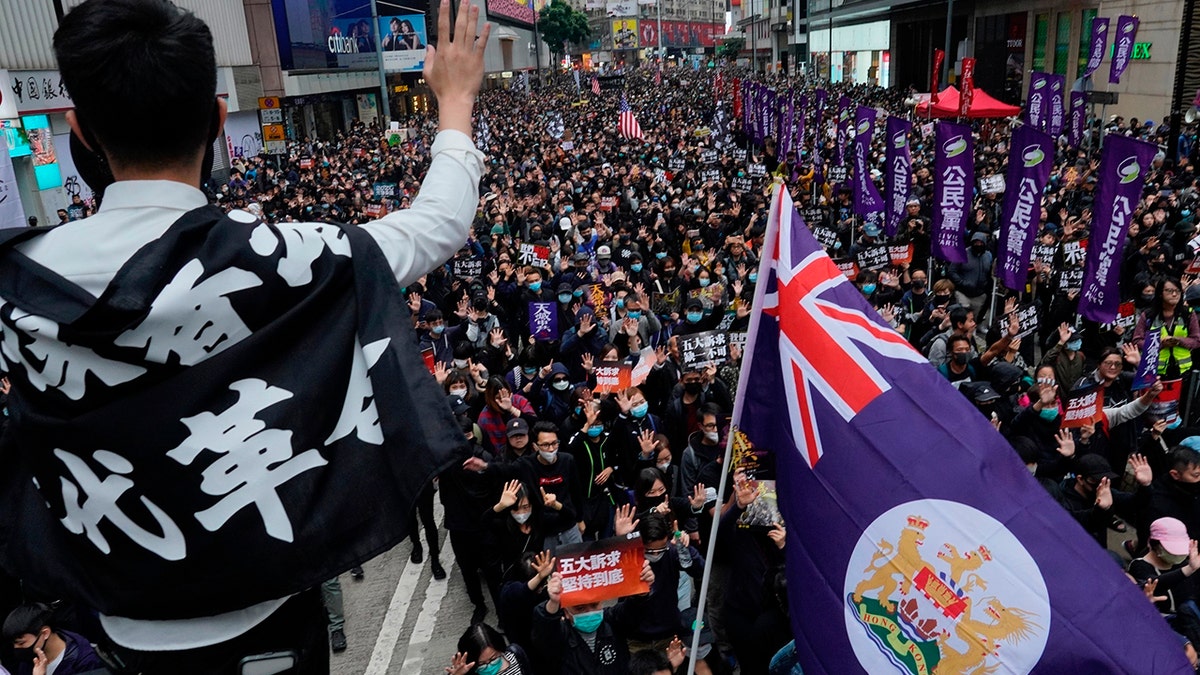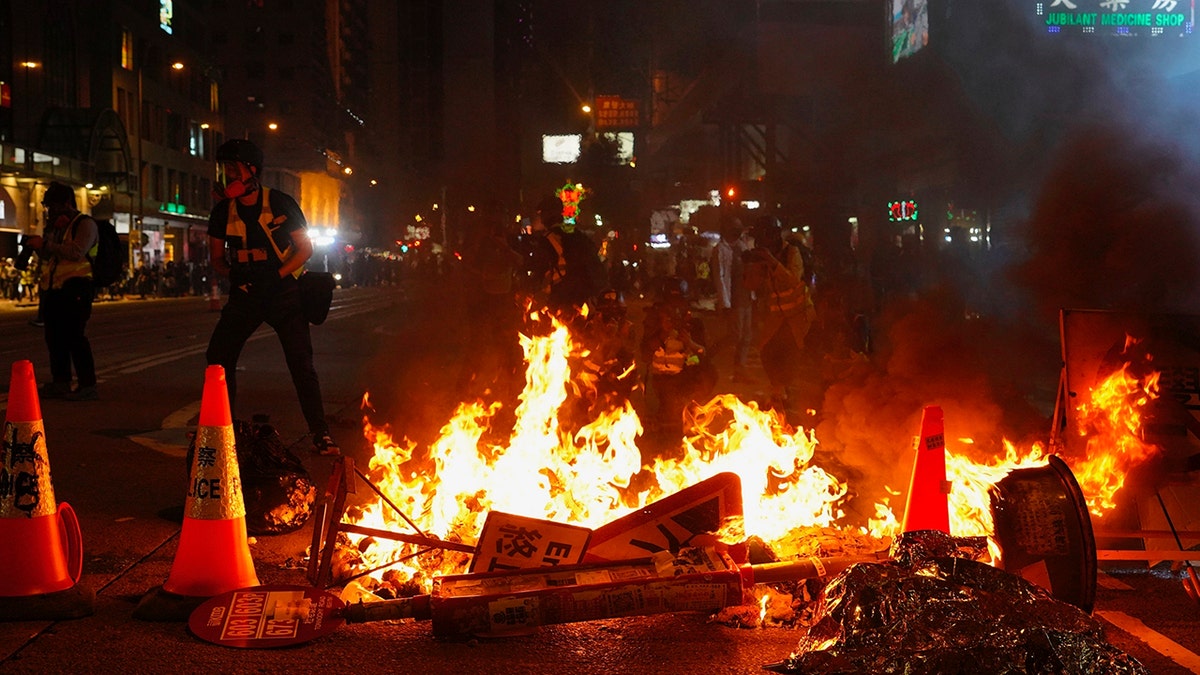Hong Kong coronavirus battle includes banning all touring arrivals, halting alcohol sales
Honk Kong is banning all tourist arriving into the country as well as halting the sale of alcohol at restaurants and bars.
Get all the latest news on coronavirus and more delivered daily to your inbox. Sign up here.
The Chinese Communist Party and the Hong Kong government used the coronavirus pandemic as a “golden opportunity” to crack down on pro-democracy dissidence, knowing that the arrest of more than a dozen activists would have normally seen people “pouring out onto the street to protest,” according to one recently arrested political leader.
Lee Cheuk Yan, who was among the at least 14 high profile pro-democracy activists taken into custody Saturday, said Hong Kong authorities carried out the arrests in a timely manner in an effort to push through more pro-Beijing candidates in the upcoming legislative council elections in September and, thus, ensure “more stringent or draconian laws for the future.”
“Hong Kong people are very alert to the concern of infection, so they are using the chance of the pandemic,” Lee Cheuk Yan told the Guardian, claiming officials took advantage of the virus to avoid a repeat of the large scale protests that flooded the streets of the semiautonomous city beginning last June. “This is a golden opportunity for them.”
CLICK HERE FOR FULL CORONAVIRUS COVERAGE
Hong Kong residents have largely chosen to stay at home since February in an effort to prevent the spread of infection. The semi-autonomous country controlled the outbreak by launching a widespread program that involved testing everyone who showed symptoms, quarantining positive cases in hospitals, and tracing all contacts within the past few days, ordering them to self-isolate.

Hong Kong media tycoon Jimmy Lai, center, who founded local newspaper Apple Daily, is arrested by police officers at his home in Hong Kong, Saturday, April 18, 2020. Hong Kong police arrested at least 14 pro-democracy lawmakers and activists on Saturday on charges of joining unlawful protests last year calling for reforms. (AP Photo/Vincent Yu)
Over the course of seven months last year, demonstrators flooded Hong Kong’s streets to first protest an extradition bill that would have sent Hong Kong prisoners to mainland China for trial, then to push for broader democratic measures, including voting rights and an independent inquiry into police conduct.
Protesters argued China was increasingly intruding on Hong Kong autonomy, violating the 1997 Sino-British Joint Declaration, which transferred power from British colonial rule over to Beijing, provided the city maintained a degree of independence from the mainland.
CORONAVIRUS PANDEMIC LED TO HONG KONG TOILET PAPER THEFT AT KNIFEPOINT: POLICE
Condemning the arrests Saturday, U.S. Secretary of State Mike Pompeo said: “Beijing and its representatives in Hong Kong continue to take actions inconsistent with commitments made under the Sino-British Joint Declaration that include transparency, the rule of law, and guarantees that Hong Kong will continue to ‘enjoy a high degree of autonomy'."
Attorney General William Barr also weighed in with a statement saying these events show how “antithetical the values of the Chinese Communist Party are to those we share in Western liberal democracies. These actions — along with its malign influence activity and industrial espionage here in the United States — demonstrate once again that the Chinese Communist Party cannot be trusted.”
Britain’s Foreign Office also criticized the arrests, saying “the right to peaceful protest is fundamental to Hong Kong’s way of life and as such is protected in both the Joint Declaration and the Basic Law.”
HONG KONG PROTESTERS FIREBOMB PROPOSED QUARANTINE BUILDING AMID CORONAVIRUS OUTBREAK: REPORTS

A man waves Hong Kong's colonial flag as people participate in their annual pro-democracy march on New Year's Day to insist their five demands be matched by the government in Hong Kong, Wednesday, Jan. 1, 2020. The five demands include democratic elections for Hong Kong's leader and legislature and a demand for a probe of police behavior during the six months of continuous protests. (AP Photo/Vincent Yu)
While the protests last year began peacefully, they increasingly descended into violence after demonstrators became frustrated with the government’s response, claiming Hong Kong leader Carrie Lam had ignored their demands and used the police to suppress them.
Hong Kong authorities had denied permission for most of the rallies, and police increasingly used tear gas and pepper spray against demonstrators, arresting hundreds at a time.
The arrests came in connection to "organizing and participating in unauthorized assemblies," last year on Aug. 18, Oct. 1 and Oct. 20.
Lee told The Guardian he believed the Chinese Communist Party was using the arrests Saturday as an act of “revenge and retaliation.”
Hong Kong authorities had cleared the Aug. 18 protest to take place in a local park, but demonstrators ended up spilling out into the streets after a total of 1.7 million people showed up. Demonstrations were peaceful during that event, according to reports.
“If we are found to be guilty of the charges, then 1.7 million people should be guilty of participation in an unauthorized assembly,” Lee said. “But that’s absurd. Are you going to prosecute 1.7 million people?”

Journalists walk past fire set by protesters in Hong Kong, Wednesday, Jan. 1, 2020. Hong Kong toned down its New Year’s celebrations amid the protests that began in June and which have dealt severe blows to the city’s retail, tourism and nightlife sectors. (AP Photo/Vincent Yu)
Martin Lee, an 81-year-old activist and former lawmaker, and democracy advocates Albert Ho and Au Nok-hin, were among those arrested Saturday. Those rounded up by police also included media tycoon Jimmy Lai, who founded the local newspaper Apple Daily, as well as Yeung Sum, a former lawmaker from the Democratic Party, according to the Associated Press.
CLICK HERE TO GET THE FOX NEWS APP
It was the second time Lai, Lee Cheuk-yan and Yeung Sum had been arrested this year. They were charged in February over their involvement in a rally on Aug. 31 last year. The League of Social Democrats wrote in a Facebook post on Saturday that its leaders were among those arrested, including Chairman Raphael Wong.
The Hong Kong government defended the arrests Saturday, saying they were "not politically motivated." The Office of the Commissioner of the Chinese Foreign Ministry in Hong Kong said police were enforcing the law against those suspected of organizing and participating in unauthorized assemblies, and foreign countries have no right to interfere, China’s official Xinhua News Agency reported.









































